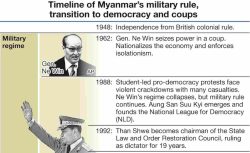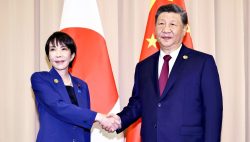U.S. Presidential Election: What Message Will The Candidates Send to Whom in The Final Stage?
15:00 JST, October 6, 2024
Who will win the U.S. presidential election, which is still a close race as the campaign enters its final stage? The outcome will be determined by swing voters who have not yet decided who to vote for.
Simply resorting to personal attacks is not enough to make a difference. The candidates should appeal for support with dignified words and actions befitting the leader of a superpower.
With less than a month to go until Nov. 5, the race has seen such unusual developments as Republican candidate and former President Donald Trump being injured in a shooting during a campaign rally in July, and Democratic candidate and President Joe Biden being replaced by Vice President Kamala Harris in August.
Harris gained backing, buoyed by a sense of renewal, but support for her has since plateaued. Meanwhile, Trump has wasted no time in using radical words and actions in a bid to consolidate support among white men and others. The two candidates’ support rates are close in seven tightly contested states, including Pennsylvania, that will be decisive in the overall result.
Amid this situation, the televised vice presidential debate on Tuesday was a calm, policy-focused event. Both sides probably decided that a mud-slinging contest with an overt partisan bias would not appeal to swing voters.
Regarding the deepening crisis in the Middle East, Democratic nominee and Minnesota Gov. Tim Walz said the “steady leadership” of the United States is essential and referred to Trump, who is getting closer to Russia and North Korea, as “dangerous.”
Republican nominee Sen. JD Vance argued that the turmoil in the Middle East occurred under the Biden administration, and that “peace through strength” and diplomacy carried out by Trump is needed. However, both men emphasized their respect for Israel’s right to self-defense.
So far, Walz has called Trump and his people “weird,” and Vance has referred to Harris and others as “extreme left,” but at the debate, they put these matters aside. While criticizing each other’s policies, there were also times when they agreed with each other’s opinions or acknowledged their own mistaken remarks.
The impact of a vice presidential debate on an election campaign is limited. However, it is significant that the two nominees demonstrated that constructive debate is possible even when there is a wide gap in political positions, and they have shown domestically and to the world what American democracy should be like.
Regrettably, Harris and Trump debated only once, in September, and their discussions did not go deep into the issues.
It is concerning that Trump has not accepted his defeat in the previous presidential election four years ago. He has not clearly stated whether he will accept the result of the upcoming election either.
The war in the Middle East is spreading, and China and Russia are ramping up their provocative actions. It is the responsibility of both sides to engage in the election fairly and accept the result once the winner is decided, to cooperate in the transfer of power.
(From The Yomiuri Shimbun, Oct. 6, 2024)
Top Articles in Editorial & Columns
-

Myanmar Will Continue Under Military Rule Even After Election, Ex-Ambassador Maruyama Says in Exclusive Interview
-

40 Million Foreign Visitors to Japan: Urgent Measures Should Be Implemented to Tackle Overtourism
-

Expansion of New NISA: Devise Ways to Build up Household Assets
-

China Criticizes Sanae Takaichi, but China Itself Is to Blame for Worsening Relations with Japan
-

Withdrawal from International Organizations: U.S. Makes High-handed Move that Undermines Multilateral Cooperation
JN ACCESS RANKING
-

Univ. in Japan, Tokyo-Based Startup to Develop Satellite for Disaster Prevention Measures, Bears
-

JAL, ANA Cancel Flights During 3-day Holiday Weekend due to Blizzard
-

China Confirmed to Be Operating Drilling Vessel Near Japan-China Median Line
-

China Eyes Rare Earth Foothold in Malaysia to Maintain Dominance, Counter Japan, U.S.
-

Japan Institute to Use Domestic Commercial Optical Lattice Clock to Set Japan Standard Time



















